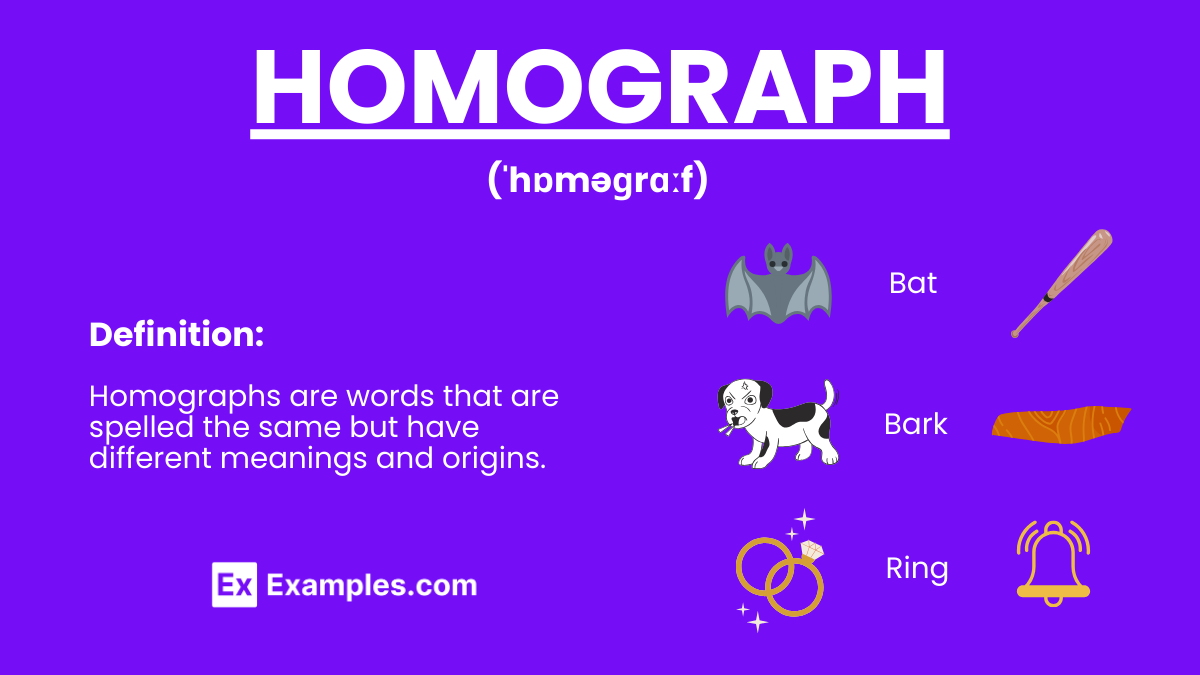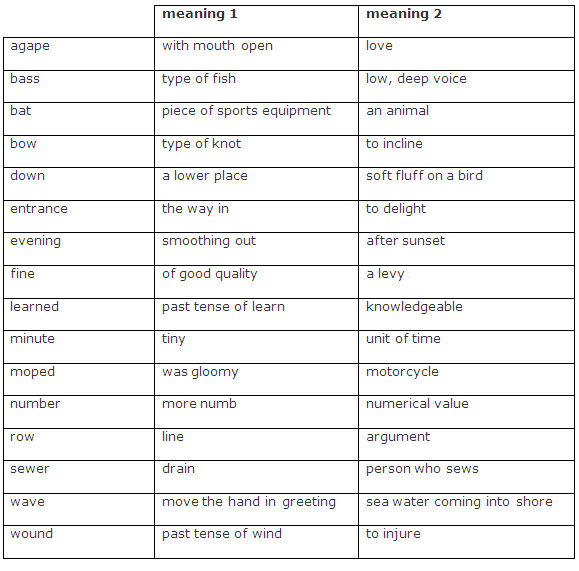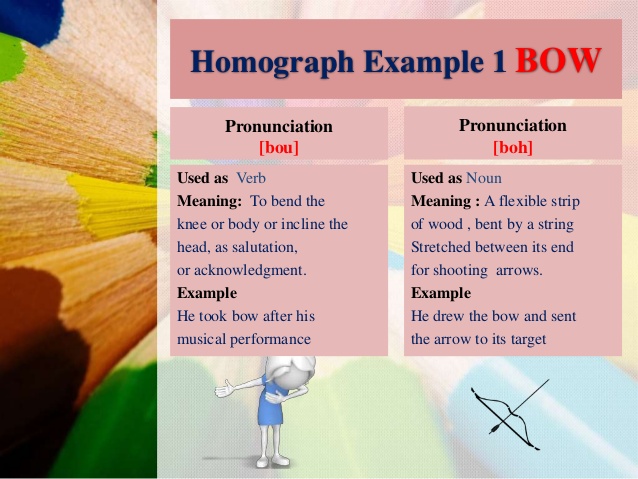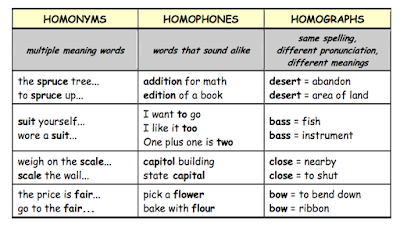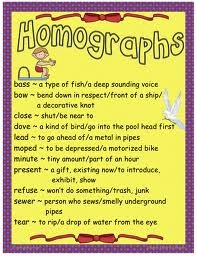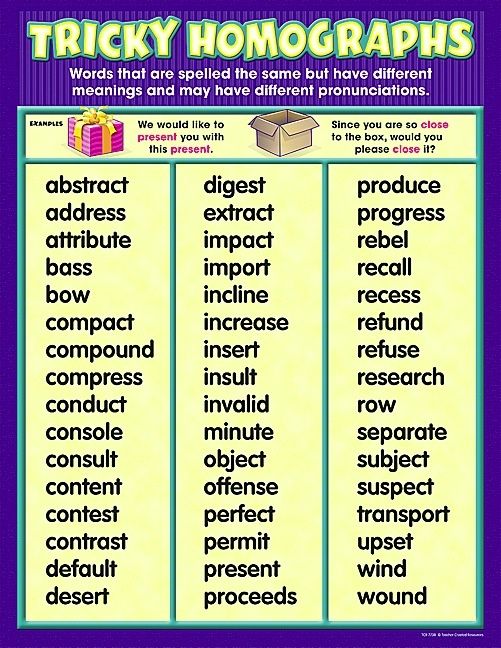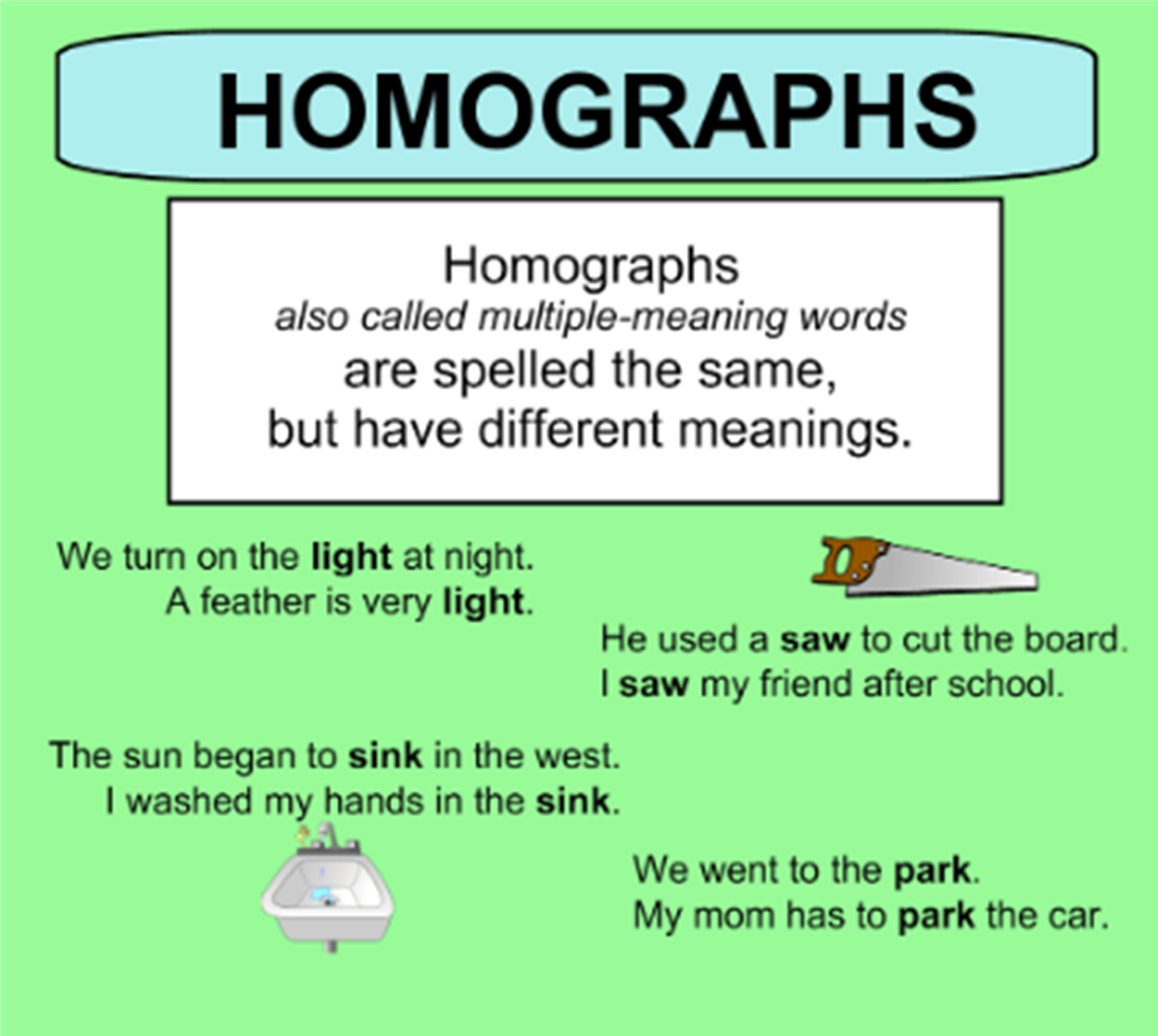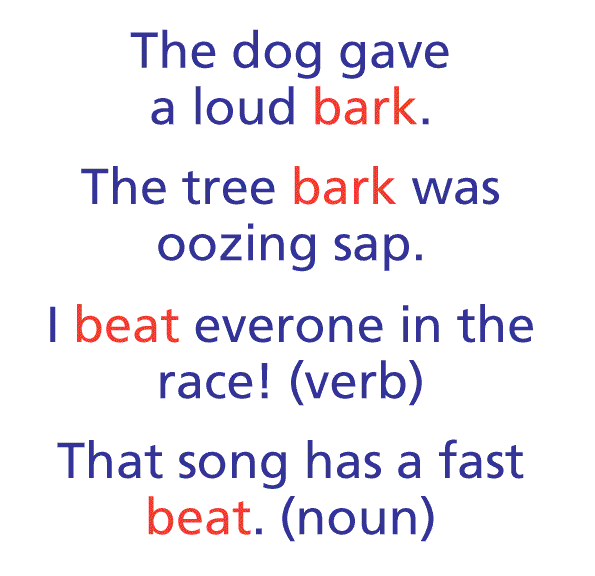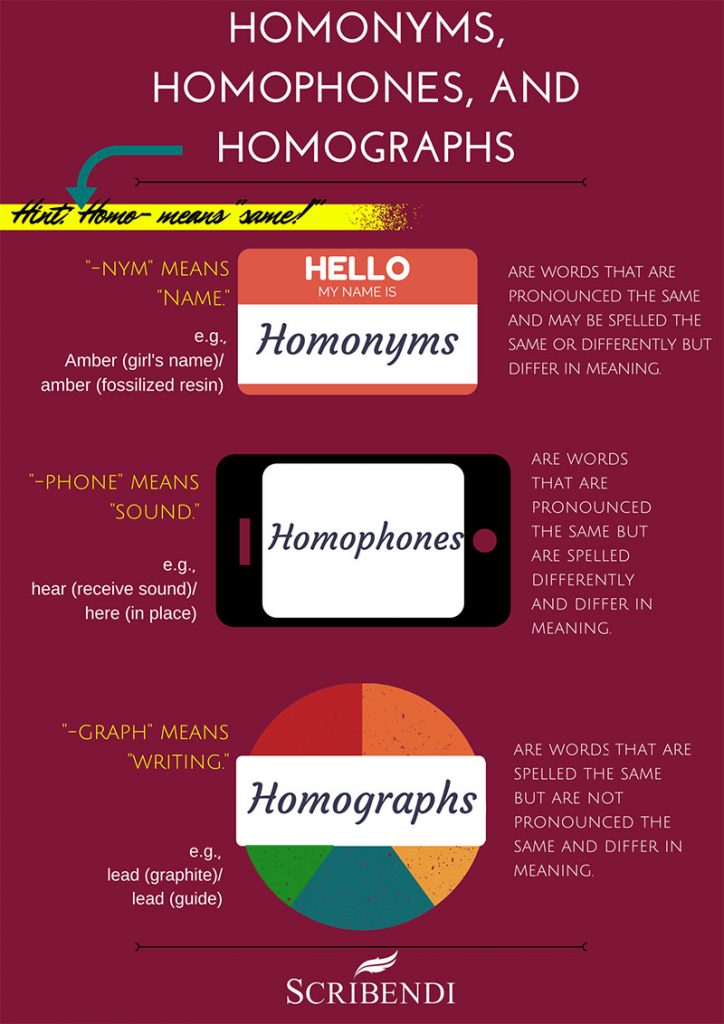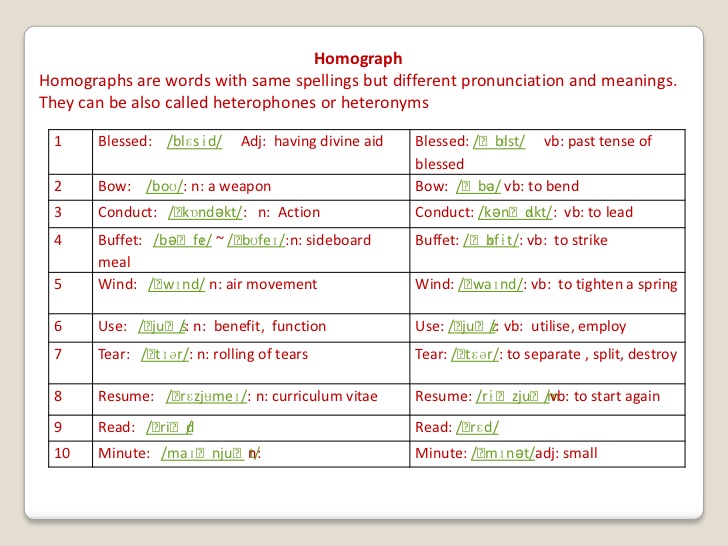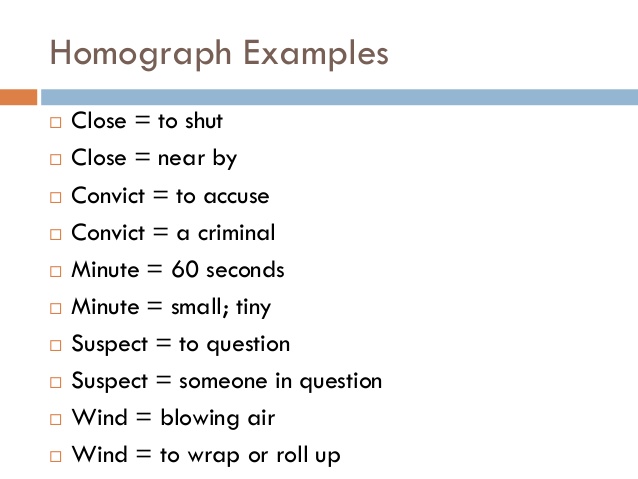60+ Homograph Examples
Homographs are one of the most fascinating classification of words in the English language. They are the perfect example of the quote about how “looks can be deceiving.” In its simplest definition, homographs are usually a pair of words that look exactly the same, in terms of spelling, with usually identical pronunciation.
However, in some cases, there are homographs that are pronounced differently, but these differences are often small and very subtle like a solitary accentuated syllable.
No matter how subtle these differences in pronunciation are, they are actually what will classify a word. For example, if a word’s accent is on its first syllable, there is a big likelihood that it is a noun or an adjective. If the accent is on the second syllable, then it must be a verb. If the prefix “re-” is added to a word, on the other hand, the word will be classified as both a noun and a verb.
What is Homograph? – Meaning
A homograph is a word that shares the same written form as another word but has a different meaning. Homographs may or may not have the same pronunciation. They arise due to the complex nature of the English language, which borrows extensively from different languages, resulting in words that look identical but are distinguished by their meaning and sometimes by their pronunciation. Examples include “lead” (to guide) vs. “lead” (a metal) and “bow” (a type of knot or to bend forward) vs. “bow” (the front of a ship). Homographs add a layer of richness and complexity to language, making context crucial for determining the intended meaning of a word in written and spoken communication.
Homographs With Different Pronunciations
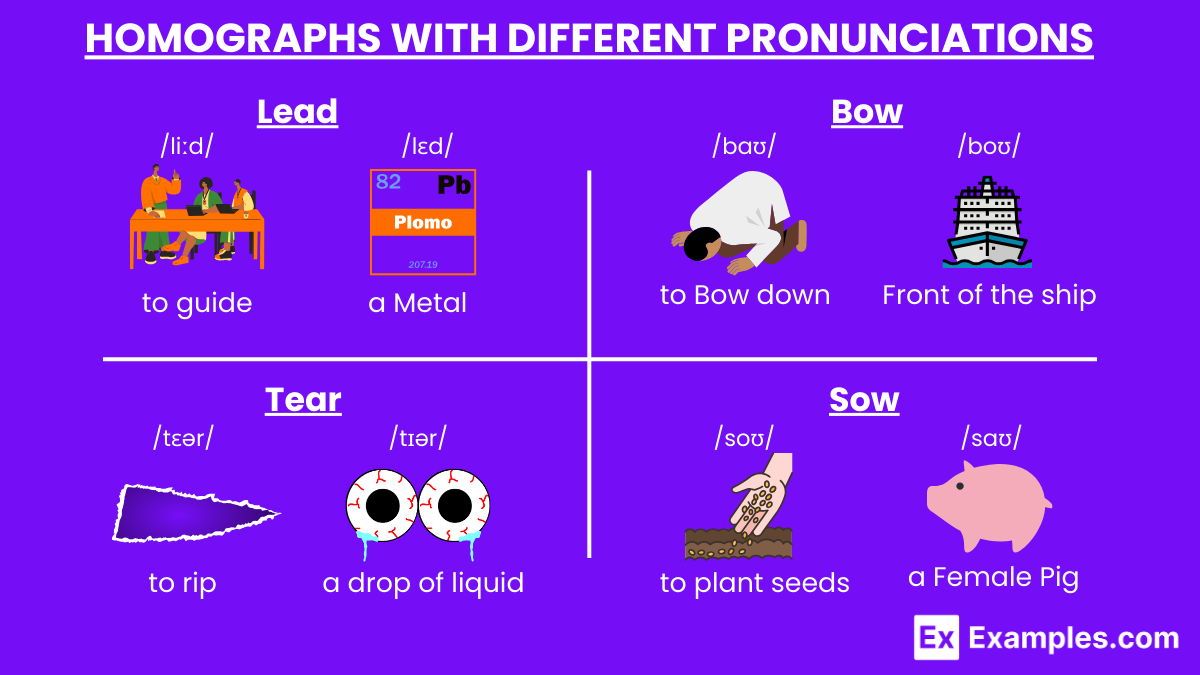
- Lead (to guide) vs. Lead (a metal) – /liːd/ vs. /lɛd/
- Read (to look at and comprehend the meaning of written or printed matter) vs. Read (the past tense of read) – /riːd/ vs. /rɛd/
- Tear (to rip) vs. Tear (a drop of liquid from the eye) – /tɛər/ vs. /tɪər/
- Bow (a type of knot or to bend forward) vs. Bow (the front of a ship) – /baʊ/ vs. /boʊ/
- Wind (to turn) vs. Wind (moving air) – /waɪnd/ vs. /wɪnd/
- Live (to reside somewhere) vs. Live (happening now) – /lɪv/ vs. /laɪv/
- Bass (a type of fish) vs. Bass (a low sound or voice) – /bæs/ vs. /beɪs/
- Row (a line of things) vs. Row (to argue or an argument) – /roʊ/ vs. /raʊ/
- Sow (to plant seeds) vs. Sow (a female pig) – /soʊ/ vs. /saʊ/
- Close (to shut something) vs. Close (near) – /kloʊz/ vs. /kləʊs/
Homographs with Same Pronunciations
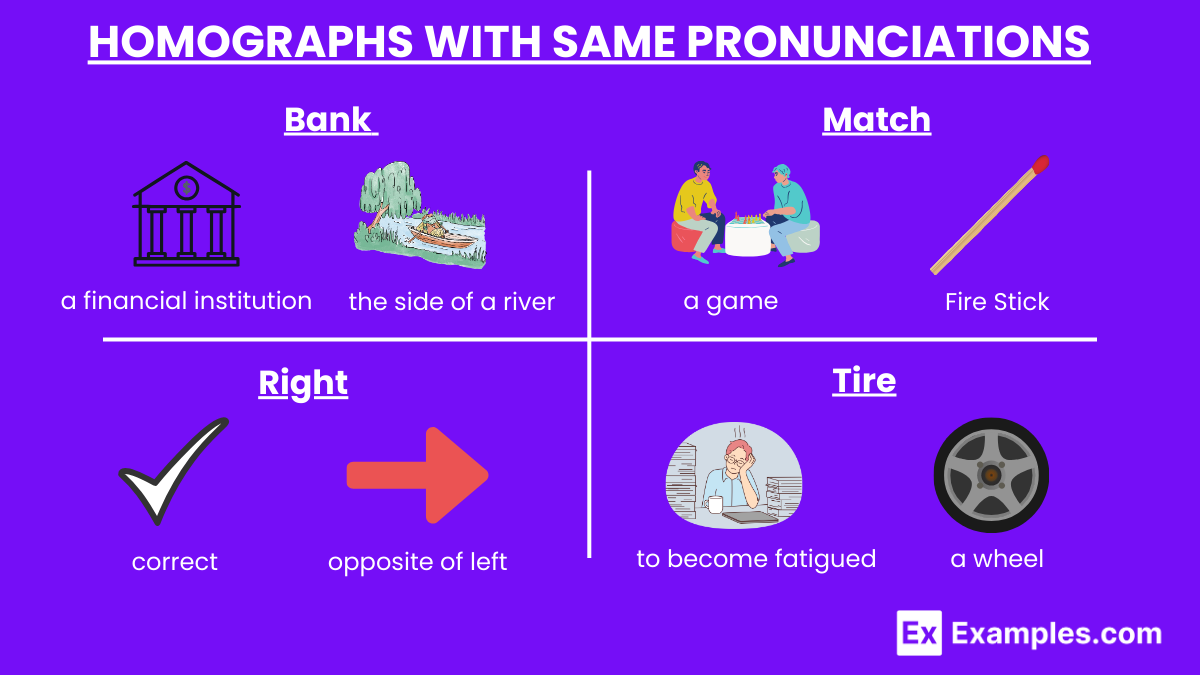
- Bat (a flying mammal) vs. Bat (a piece of sports equipment) – /bæt/
- Bank (the side of a river) vs. Bank (a financial institution) – /bæŋk/
- Bark (the sound a dog makes) vs. Bark (the outer layer of a tree) – /bɑːrk/
- Match (a game or contest) vs. Match (a stick for making fire) – /mætʃ/
- Ring (a circular piece of jewelry) vs. Ring (a sound bells make) – /rɪŋ/
- Light (brightness) vs. Light (not heavy) – /laɪt/
- Right (correct) vs. Right (opposite of left) – /raɪt/
- Fair (equitable) vs. Fair (a gathering or event) – /fɛər/
- Tire (to become fatigued) vs. Tire (a part of a wheel) – /taɪər/
- Well (in good health) vs. Well (a water source) – /wɛl/
Homographs Examples With Sentences
The mouth of a huge bass was painted on the bass drum.
The first bass in the sentence refers to both freshwater and marine species of perch-like fishes, while the second bass in the sentence refers to sounds and instruments with the lowest musical range like the bass guitar or the bass drum.
The nurse wound the bandage around my wound.
The first wound in the sentence is the past tense of wind which refers to taking a spiral course, while the second wound refers to an injury to a living tissue.
I shed a tear when I saw the tear in my shirt.
We’ve already used these words in the explanation for homographs above so you already understand the concept. However, incorporating them in a sentence emphasizes just how different these words really are. And no one would know that at the first look. Fascinating, right?
Sheldon and Amy weren’t close enough to the car door to be able to close it so Leonard had to do it himself.
This one is a little simpler to understand since the context clues are very apparent. The first close refers to being a short distance away from another object while the second close refers to the act of moving an object to cover an opening.
I did not object after being asked to carry the large object.
The words object and object differ in pronunciation as well. The first object refers to the act of expressing one’s disagreement or disapproval. The accent in this word is in the second syllable which means that it is a verb. The second object, which means a material thing that can be seen and touched, has the accent on its first syllable giving us the idea that it is either a noun or an adjective based on what we have discussed earlier.
If the tap doesn’t work, tap it.
This is a horrible advice but a perfect example of a homograph. The first tap refers to a faucet and the second one means to strike lightly. So if you use the words’ synonyms instead, the sentence would go like this: If the faucet doesn’t work, strike it lightly. But why would we go with that when it sounds less interesting?
The boys, in staying true to being basketball athletes, brought a ball to the Winter Ball.
The first ball refers to an inflated round object athletes use in playing basketball. The second ball, on the other hand, refers to a formal dance.
The firm had firm rules.
The first firm refers to an organization while the second firm refers to hardness or rigidity.
The citizens were fine about the new fine that will be enforced to rule breakers.
The first fine refers to the quality of being in a satisfactory or pleasing manner, while the second fine refers to the payment asked from a person who has committed an unlawful act.
A fly can fly.
There is something modestly poetic about the use of two homographs in one sentence. However, its definition is surprisingly literal. The first fly refers to an insect considered to be a carrier of diseases. The second fly refers to the ability to move through the air with control and precision.
Exercises on Homographs
- The ____ in shining armor saved the day.
- Please water the ____ in the garden.
- I need one more ____ of the puzzle.
- My ____ is going to school this year.
- The ____ delivered the letters promptly.
- We saw a beautiful ____ view on our vacation.
- Say ____ to drugs.
- I ____ a big lunch, so I’m not hungry.
- Could you please move a little to the ____?
- They used a ____ to carry water from the well.
Answers:
- The knight in shining armor saved the day.
- Please water the flower in the garden.
- I need one more piece of the puzzle.
- My son is going to school this year.
- The mail delivered the letters promptly.
- We saw a beautiful sea view on our vacation.
- Say no to drugs.
- I ate a big lunch, so I’m not hungry.
- Could you please move a little to the right?
- They used a pail to carry water from the well.
Table of Homographs
The Word Bow as a Homograph
Homographs, Homophones, and Homonyms
Examples of Homograph
Tricky Homographs Table
Homograph Examples with Illustration
Homograph in Sentence Examples
Homographs
10 Homograph Examples
Homographs and Their Meanings
Homographs, Homophones, and Homonyms
These are the three classification of words in the English language that a lot of people confuse as having the same definition, which is not at all surprising since they do have similar qualities. To truly understand homographs, let us discuss first its two other equivalents.
Homographs
From its name itself, we can gather that homographs include pictures, images, and drawings, which is apt because, as aforementioned, homographs refer to words that look the same or are spelled the same but actually have different meanings. This is the strict rule to which homographs abide to.
A common example for homographs is the word tear. Tear can refer to a rip caused by an object, such as paper, being pulled apart. But tear can also refer to the liquid that comes out of a person’s eye when he cries. So although the words tear and tear look mind-blowingly the same, they actually have different meanings and, if you’ve read them right, also have different pronunciations.
Homophones
Homophones, on the other hand, refer to sound. Which means that, in classifying a word, we must listen to how it is pronounced instead of studying how it is spelled the way we should with homographs. Homophones refer to words that sound exactly the same but actually have different spellings and meanings.
A common homophone are the words oral and aural. See what happened right there? Aural and oral. It’s like you were pronouncing the same word twice. It’s amazing how these very different words sound exactly the same and, without context clues, who would know you were pronouncing two words instead of one? Oral means by word of mouth, or spoken instead of being written. Aural, on the other hand, refers to the ears and its ability to hear. These words are unalike in meaning and in spelling but no one would know since they sound the same!
Homophones Examples with Sentences
In his fantasies, he was the heir of the air.
As discussed earlier, homophones sound the same but actually have different meanings. In this case, even if heir and air are alike in pronunciation, they don’t mean the same. The former refers to a person who is legally entitled to a property or title, while the latter refers to the invisible gaseous substance that surrounds the earth.
The deer he caught alive while hunting was very dear to him.
As you may already know, the first deer refers to the hoofed grazing majestic animal with antlers while the latter refers to the act of regarding someone with deep affections.
I would die if you asked me to dye my hair black.
This is an exaggeration a lot of teenagers are guilty of. The first die refers to the inability to continue living. While the latter refers to the synthetic substance used to add or change the color of something.
The raise in bus fare seemed fair to everyone.
The first fare refers to the money a passenger of a public transport has to pay. While fair means legitimate and just.
I damaged my right eye by rubbing it while I had contact lenses on.
The first I refers to the Roman numeral for one, while the second eye refers to the globular organs in the head through which an organism can see.
Homonyms
Homonyms, broadly defined, refer to words that sound and look the same, but have different meanings. Where homographs look the same and homophones sound the same, homonyms are a combination of the two. A common example of a homonym are the words left and left. They look exactly the same, are spelled the same, and if you pronounce them aloud, they also sound the same. The only difference is in what the word means.
Left can mean the opposite of right, but left could also refer to the past tense of the word leave. (Homonymy is what you call the relationship between two homonyms, which, in this case, is left and left.) Homonyms can be tricky. Other people have difficulties in pointing them out and comprehending them once they recognize them. But it’s actually very simple if you could understand the rest of the meaning of the sentence where the homonym is a part of.
For example, when your friend tells you that your “teacher already left,” you wouldn’t assume that it meant she went to the right, right? (Look at that. Another homonym.) Of course not. You’d know that what your friend meant is that she is no longer in the room.
Homonyms Examples with Sentences
He can’t bear the thought of seeing a bear during their camping.
The first bear refers to the ability to accept or stand the idea of something, while the second bear refers to a large, heavy mammal.
The dog’s loud bark was directed to a tree bark.
The first bark refers to the sharp explosive cry of animals, which in this case is a do, and the second bark refers to the tough protective layer of a tree trunk.
The fair Queen of the land is also a fair ruler.
The first fair is a word that describes a woman as beautiful, while the latter refers to the quality of being gentle and kind, yet upright in ruling.
A man can tire of changing a car’s tire.
The first tire refers to the need to sleep or relax, while the second tire refers to the wheels of a vehicle.
The seed rose to become a blooming rose.
The first rose refers to the past tense of the word rise which means to move from a lower position to a higher one. The second rose refers to a prickly bush that bears fragrant flowers that is widely considered as the symbol of love.
Whenever you find yourself in the presence of a homograph, a homonym, and a homophone, and they confuse you, listen and comprehend, instead, the rest of the sentence to which the word is a part of. It’s called looking for context clues which are hints in the sentence itself that can help you understand the meaning of a difficult word. Once you get used to them, you might actually find this trio one of the most interesting bunch in the English language!
Homographs can be confusing at first, but if you get used to them, they are actually extremely interesting. But then again, the English language in itself is fascinating enough to keep you busy for the rest of your life. Homographs are simply another thing about it that makes studying it even more fun and engrossing.



